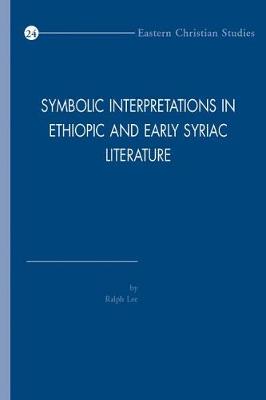Eastern Christian Studies
1 primary work
Volume 24
Symbolic Interpretations in Ethiopic and Early Syriac Literature
by R. Lee
Published 18 October 2017
The palimpsest of Ethiopian Christianity reveals the possible impact and
influence of several hands: Judaic, Egyptian, and Syrian. This book
investigates the influence of Syrian Christianity upon the trajectory of
Ethiopian Christianity, proposing that many of the so-called 'Judaic'
practices may have arisen through interaction with Judeo-Christian
Syriac Christianity, rather than from an Old Testament context,
exploring Ethiopic and Syrian literary links using Ge'ez, Amharic and
Syriac sources to show how Syrian and Ethiopic traditions relate. The
symbolic motifs of the Ark and the Cross, as well as the perception of
Paradise are explored in Ethiopic hymnody or Deggwa of St Yared,
the andemta Bible commentaries, and the national epic, the
Kebra Nagast, compared with Syriac works of the fourth century
Syriac theologian-poet Ephrem, his later devotee Jacob of Serugh, and
the earlier Syriac Odes to Solomon. The material common to
Ethiopic and Syriac literature demonstrates the complexity of the
Judeo-Christian thought-worlds from which they derived, implying more
nuanced influences than have previously been postulated.
influence of several hands: Judaic, Egyptian, and Syrian. This book
investigates the influence of Syrian Christianity upon the trajectory of
Ethiopian Christianity, proposing that many of the so-called 'Judaic'
practices may have arisen through interaction with Judeo-Christian
Syriac Christianity, rather than from an Old Testament context,
exploring Ethiopic and Syrian literary links using Ge'ez, Amharic and
Syriac sources to show how Syrian and Ethiopic traditions relate. The
symbolic motifs of the Ark and the Cross, as well as the perception of
Paradise are explored in Ethiopic hymnody or Deggwa of St Yared,
the andemta Bible commentaries, and the national epic, the
Kebra Nagast, compared with Syriac works of the fourth century
Syriac theologian-poet Ephrem, his later devotee Jacob of Serugh, and
the earlier Syriac Odes to Solomon. The material common to
Ethiopic and Syriac literature demonstrates the complexity of the
Judeo-Christian thought-worlds from which they derived, implying more
nuanced influences than have previously been postulated.
